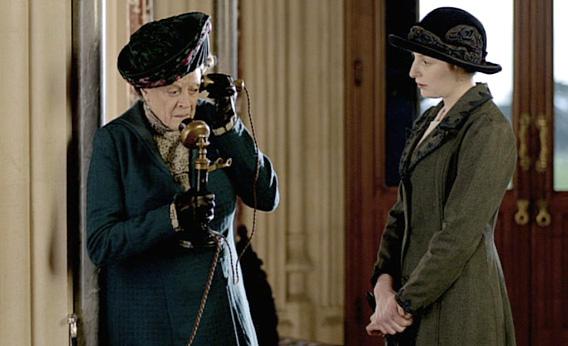See our Magnum Photos gallery on the English countryside.
My dear boys,
Did I cry? Dan, I blubbed like a baby. I had a Pavlovian reaction to the score of this episode, filled as it was with stirring strings. I especially loved that they closed the episode on a somber version of the theme tune. That’s such a British thing to do. Some English soaps have extra-soppy variations on the theme that they use at the end of episodes in which a beloved character has been killed off (compare EastEnders’ usual theme tune with the mourning edition), so it was nice to see William get that treatment.
Don’t be too hard on poor Daisy. Her reluctance to go through with the marriage came from a good and honorable place: not wanting to deceive a man she cared for but didn’t love, even if it was his last wish. (Perhaps she’s just too young to know her own mind, though; she and William obviously had a deep connection. She did, after all, feel someone “walking over her grave” at the moment that William and Matthew fell in battle. So did Mary, of course, which reminded me of the line from Kipling: “The Colonel’s lady an’ Judy O’Grady are sisters under their skins.”) I suspect Daisy was also worried that some strangers would tag her as a benefits cheat if she went through with a death-bed marriage—a crafty housemaid “out for the widow’s dole,” as that nasty vicar put it. The dowager countess did a magnificent job of reminding the caddish curate that he was in effect on Lord Grantham’s dole—receiving his job, his home, and even the flowers that decorate his church from his lordship’s grace and favor.
There are no words to describe my love for the dowager countess’s phone call with “Shrimpy.” My affection stems from two sources: 1) Violet clearly shares my own distaste for that devil’s instrument the telephone; and 2) Shrimpy! (I bet that nickname dates back to an unfortunate incident during the Eton wall game when the marquis was just a wee lad.) I’ve been dipping into the Downton literature—the books inspired by the show could fill their own table in Barnes & Noble—and after only a couple of chapters of Lady Almina and the Real Downton Abbey, it’s clear to me that the male aristos of this time were known by more names than Sean Combs/Diddy/P. Diddy/Puff Daddy. In the space of just a few pages, I came across George known as Porchy, Nathan known as Natty, and Edward known as Bertie, so a name like Shrimpy feels like a touch of authenticity.
It’s great to see old Vi put her amazing networking and browbeating skills to such effective use in bringing the former footman back to Downton. Dr. Clarkson showed himself to be a total jobsworth when he refused to find a bed for William, but the countess saw right through him: “When you give little people power, it goes to their heads like strong drink.” Confronted with an immovable object, she simply went over his head.
Did you ever think you’d see Lady Mary holding a bowl for someone to vomit into—or that it would seem perfectly in character? When Isobel came upon Mary tending to her son’s most intimate needs so lovingly, Mary dismissed her ministrations as “nothing,” but Isobel was quite right to call it “the very opposite of nothing.” For me, that was the most moving moment of a very emotional episode. What, if anything, sent you a-sniffling, Seth?
Whatever you discover, tell me. Don’t hold anything back,
June
Editor’s note: For the benefit of American readers who haven’t yet seen Season 2 of Downton Abbey, please do your best to avoid spoilers when commenting.
